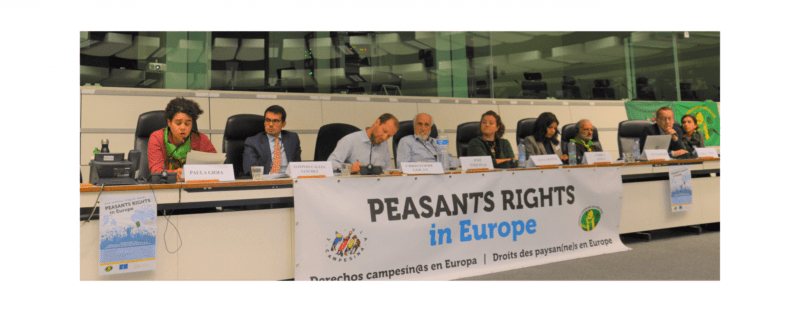Two-years after the adoption of the UN Declaration on the Rights of Peasants and other people working in rural areas (UNDROP), considerable work remains to implement and guarantee the rights it sets out – the Green Deal, Farm to Fork Strategy (F2F) and the CAP national strategic plans are the place to start.
For European Coordination Via Campesina, the objectives of the Farm to Fork Strategy and the European Green Deal can only be reached by integrating clear measures to implement the UNDROP, including within the CAP national strategic plans. Peasant agroecological methods and family farming offer ready-made, proven solutions to climate and biodiversity issues. A clear shift of European Policy in support of these practices would help to avoid the various human rights, economical and social issues facing small-scale farmers and agricultural and migrant workers, many of which were highlighted and exacerbated by the COVID19 pandemic.
The UNDROP represents an opportunity to transform food systems in an holistic way, with the long-term vision needed to tackle climate change. These key rights, if respected and used as a framework, would lead the EU towards achieving the Green Deal goals. To give just a few examples, proper implementation of Article 14, to ensure healthy working conditions for peasants and migrant workers, could have prevented the unsafe working conditions of slaughterhouse and other agrifood workers around Europe in the recent pandemic.[i] Further subsections of Article 14, relating to the use and handling of toxic and harmful chemicals, along with the right to traditional peasant seeds highlighted in Article 19, are key to achieve the EU’s goals on pesticide reduction and preventing the pollution of natural areas.[ii] If the rights laid out in Article 17, relating to access to, use of and control over land, were protected, the land grabbing and concentration that contributes to significant losses of biodiversity could be tackled and the EU’s focus on next generation farming (a key topic of today’s Agricultural Outlook conference) given a bigger focus.[iii]
The clear parallels that can be drawn between the outcomes of the proper implementation of the UNDROP and the goals of the Green Deal and F2F Strategy highlight the important role that peasant farmers, who represent the backbone of EU agriculture, have to play within the urgent agriculture transition.
This legal tool offers a ready-made, rights-based roadmap for EU Institutions and Member States to ensure the objectives laid out for the future of EU agriculture, so that they can be achieved in an effective and democratic way that will truly “leave no one behind”.
Moreover, at both European and national levels, the many organisations that have been fighting to implement and ensure these rights for decades, such as ECVC, it’s member organisations and allies, can offer expertise on policy proposals towards a paradigm shift and achieve real change for our food systems and consequently to society and the planet. Instead of focusing on purely profit-oriented, technical and digital solutions that in the end promote further intensification through intensive livestock farming and monocultures, allowing large scale food-industry to maintain the status quo and putting the costs of the long term impacts of those model of productions on the shoulders of the future generations, it is now time for fair food and agricultural policies promoting healthy economies and fair models of production and distribution that guarantee the right to quality food for all citizens.
The EU must ensure that the Farm to Fork Strategy is in line with the UNDROP declaration and use these tools, resources and knowledge to act now, before it’s too late.
To find out more about the UNDROP, and how its implementation can help to achieve the goals of the Green Deal and Farm to Fork Strategy, see the resources below:
- Read the UNDROP in the different UN languages
- ECVC video on the UNDROP
- ECVC infographic on the implementation of the UNDROP
- ECVC webinar on Food Sovereignty and the Farm to Fork Strategy
- ECVC’s key demands for the Farm to Fork Strategy
Contacts :
Paula Gioia – Comité de coordination ECVC – + 49 178 139 0024 PT, DE, EN, ES
Andoni García Arriola – Comité de coordination ECVC : +34 636 451 569- ES, EUZ
[i] Article 14 1. Peasants and other people working in rural areas, irrespective of whether they are temporary, seasonal or migrant workers, have the rights to work in safe and healthy working conditions, to participate in the application and review of safety and health measures, to select safety and health representatives and representatives in safety and health committees, to the implementation of measures to prevent, reduce and control hazards and risks, to have access to adequate and appropriate protective clothing and equipment and to adequate information and training on occupational safety, to work free from violence and harassment, including sexual harassment, to report unsafe and unhealthy working conditions and to remove themselves from danger resulting from their work activity when they reasonably believe that there is an imminent and serious risk to their safety or health, without being subjected to any work-related retaliation for exercising such rights.
[ii] Article 14 4. (a)-(e) and Article 19.1-19.8
[iii] Article 17.6 Where appropriate, States shall take appropriate measures to carry out agrarian reforms in order to facilitate the broad and equitable access to land and other natural resources necessary to ensure that peasants and other people working in rural areas enjoy adequate living conditions, and to limit excessive concentration and control of land, taking into account its social function. Landless peasants, young people, small-scale fishers and other rural workers should be given priority in the allocation of public lands, fisheries and forests.

